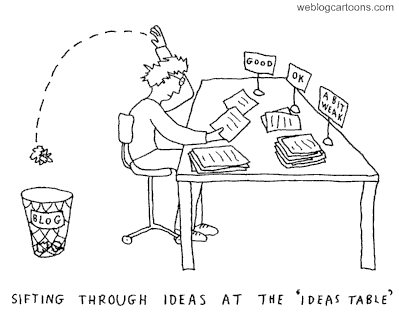Being Critical of Critical Reflection in TAI
This blog is an extension of a
couple of points that people have commented on in a previous post – namely the
central role of reflection (particularly critical reflection) as part of
Teaching as Inquiry.
If I had to be critical of myself,
I don’t think I am a critical reflector (even though I understand what it
means). Or am I? Am I measuring myself against research that
suggests I must be at some ‘level’ of reflective practice to be truly reflective? Great in theory, but difficult in
practice.
Bardane (2014) points to the theory-practice
divide when it comes to being reflective in TAI. This comes about because of the suggestion (I
would argue assumption) that the, “practitioner has certain skills and relevant
theoretical and practical knowledge, in order to do reflection” (p.110). This
is supported by Saric & Steh (2017, p.67) who note that, “despite the
well-established role of reflection, a large gap between the professed goals
and actual reflective practice of teachers remains”.
Why the gap?
I suggest this has come about as a
result of the increasing complexity of the teaching role. Not only do we have the ‘core business’ of teaching,
but we are also expected to be adept administrators, organisers, coaches,
mentors, social workers, and have an understanding of the learners in front of
us physically, socially, emotionally/mentally, spiritually, culturally and
intellectually. It is little wonder that
Saric & Steh (2017, p.70) write that expecting teachers to, “take time at
their own initiative to integrate the process of reflection in their work
deliberately is unrealistic”.
On top of this, to be critically
reflective (because the literature recognises this as being the most
transformative) is no small feat.
Richards & Farrell (2005, as
cited in Farrell, 2014, p.1) notes, reflection can be understood as, “the
process of critical examination of experiences, a process that can lead to a
better understanding of one’s practices and routines”. But what is a critical examination? To
critically examine something (within the context of teaching) is to challenge
personally held beliefs and assumptions about our practice. To question who is being advantaged and
disadvantaged through our current practice?
Finally, it involves looking at our teaching practice from the
perspectives of the learner, the learner’s family, and wider community. This level of examination is inherent in Timperley, Kaser & Halbert's (2014) Spiral of Inquiry (a model suggested by the Ministry of Education) in sentiments such as, "deep understanding" (p.17), "getting deeply held beliefs out on the table" (p.14), and "checking our assumptions" (p.14).
This is a lot to ask of any
teacher. It seems as the role of
reflection, (especially the requirement for critical reflection), as part of
TAI and of reflective practice has grown in stature, the infrastructure within
schools has not adapted accordingly to recognise its significance on teacher
workload. We are robbing Peter to pay
Paul with respect to time. It may be no coincidence
that this (in part) accounts for half of all secondary teachers quitting within 5 years.
Don’t get me wrong, I recognise why
we want teachers to be critically reflective and critically examine their
practice. We are very good at being
reflective but often in such a way that it supports or substantiates our
currently held beliefs. The path of
least resistance. TAI that becomes self-fulfilling
and merely a process to get through and finished so that aspect can be “ticked
off” for the year.
So how do we address it within the
confines of time and school infrastructure (which are outside our immediate
sphere of influence)? The solution may
lie in how we perceive and value reflection.
Let’s start by deemphasising
critical reflection. Aspire to it by all
means. Work towards it. Develop your reflective skills in such a way
that is realistic and manageable given the complexity of your role. Surely being reflective at some level is
better than not being reflective at all?
From our previous work on reflective practice, we
considered the depth of reflection from surface to deep, theoretical analysis summarised
in the five levels of reflective practice noted by Zeichner and Liston (1996,
in Finlay, 2007, p.4):
1. Rapid reflection - immediate, ongoing and automatic action by the
teacher.
2. Repair –thoughtful decisions to alter their behaviour in response to
students’ cues.
3. Review – thinking, discussing, writing about some element of their
teaching.
4. Research –systematic and sustained thinking over time, informed by
research.
5. Retheorizing and reformulating –critically examining personal
practice in the light of academic theories.
We further discovered that through
the MindLab survey on this topic, the overwhelming majority of us work at the
first three levels of reflection. This
is hardly surprising when we consider the final two levels require a
considerable input of time and effort to fully realise. While it may be argued that the
lower levels are somewhat superficial, I would suggest that this “just in time”
reflection, or “reflection on action” is perfectly acceptable so long as it can
be curated with evidence.
If the importance of being
critically reflective is being given increasing status, then teachers need to
be given the time and the environment in which to do it properly, otherwise it
will remain in the “too hard basket”.




Comments
Post a Comment